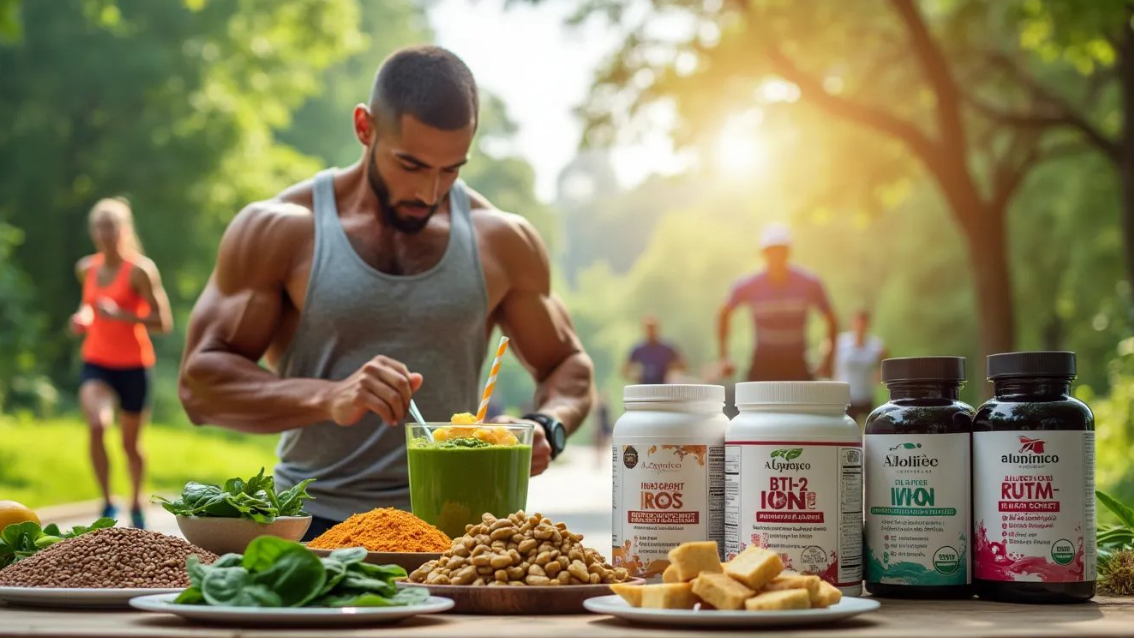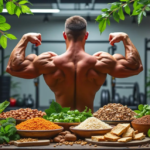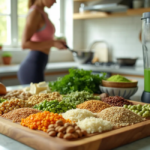For vegan athletes, maintaining optimal levels of vitamin B12 and iron can be challenging yet crucial for peak performance. This comprehensive guide delves into the world of vegan B12 and iron supplements, offering expert advice on overcoming deficiencies while adhering to a plant-based lifestyle. Whether you’re a seasoned vegan athlete or just starting your plant-based journey, this article will equip you with the knowledge to fuel your athletic endeavors effectively.
Understanding B12 and Iron Deficiencies in Vegan Athletes
Vegan diets, while rich in many nutrients, can be lacking in vitamin B12 and iron. These deficiencies can significantly impact athletic performance and overall health.
B12 Deficiency in Vegan Diets
Vitamin B12 is primarily found in animal products, making it a nutrient of concern for vegans. Plants don’t naturally produce B12, and while some foods are fortified, it’s often not enough for optimal athletic performance.
Iron Deficiency Risks for Vegan Athletes
While iron is present in many plant foods, it’s in a form called non-heme iron, which is less easily absorbed by the body compared to the heme iron found in animal products. Additionally, intense physical training can increase iron requirements, putting vegan athletes at a higher risk of deficiency.
The Critical Role of B12 and Iron in Athletic Performance
Both B12 and iron play crucial roles in athletic performance, impacting energy levels, oxygen transport, and recovery.
B12’s Impact on Energy and Recovery
Vitamin B12 is essential for energy metabolism and red blood cell formation. It helps convert the food you eat into energy your body can use, making it crucial for maintaining stamina during workouts and competitions.
Iron’s Role in Oxygen Transport and Endurance
Iron is a key component of hemoglobin, the protein in red blood cells that carries oxygen to your muscles. Adequate iron levels ensure your muscles receive the oxygen they need during exercise, directly impacting your endurance and performance.
Vegan B12 and Iron Supplement Options
There are various supplement options available for vegan athletes to meet their B12 and iron needs.
B12 Supplement Forms
- Cyanocobalamin: More common and generally less expensive
- Methylcobalamin: The active form of B12, potentially better absorbed by some individuals
Iron Supplement Types
- Ferrous sulfate: Highly absorbable but may cause digestive discomfort
- Ferrous gluconate: Often better tolerated than ferrous sulfate
- Plant-based iron: Derived from sources like curry tree leaves or thyme, gentler on the stomach
For more information on vegan protein supplements that may contain B12 and iron, check out our guide on choosing the right protein supplement for vegans and vegetarians.
How to Choose the Right Vegan B12 and Iron Supplements
Selecting the right supplements is crucial for addressing deficiencies effectively.
Factors to Consider for B12 Supplements
- Form (methylcobalamin or cyanocobalamin)
- Dosage
- Delivery method (sublingual tablets often have better absorption)
- Third-party testing for quality assurance
Choosing Iron Supplements
- Your current iron status (get tested if you’re unsure)
- The form of iron in the supplement
- Additional ingredients that may enhance absorption
- Potential side effects and tolerability
Maximizing Absorption of B12 and Iron from Supplements
Proper absorption is key to getting the most out of your supplements.
Enhancing B12 Absorption
- Consider sublingual or liquid supplements
- Take smaller doses more frequently
- Pair B12 with folate for enhanced effectiveness
Improving Iron Absorption
- Pair iron supplements with vitamin C sources
- Avoid taking iron with calcium-rich foods or coffee
- Take iron supplements on an empty stomach when possible
Combining Supplements with Whole Food Sources
While supplements are important, incorporating whole food sources can provide additional benefits.
B12-Fortified Foods for Vegan Athletes
- Nutritional yeast
- Fortified plant milks
- Certain breakfast cereals
Iron-Rich Plant-Based Foods
- Leafy greens (spinach, kale)
- Legumes (lentils, chickpeas)
- Nuts and seeds (pumpkin seeds, almonds)
- Whole grains (quinoa, oats)
For more information on complete protein sources that may also provide iron, check out our article on complete proteins for plant-based athletes.
Expert Opinions and Athlete Experiences
“In my experience working with vegan athletes, consistent B12 supplementation is non-negotiable. I typically recommend a daily dose of 1000mcg cyanocobalamin or 2000mcg methylcobalamin to ensure optimal performance and recovery.”
– Dr. Sarah Johnson, Sports Nutritionist specializing in plant-based diets
“As a vegan ultramarathon runner, I’ve found that paying close attention to my iron levels has been crucial. I take a low-dose iron supplement daily, always with vitamin C, and I’ve noticed a significant improvement in my endurance and recovery times.”
– Mark Thompson, Vegan Ultramarathon Champion
Top-Rated Vegan B12 and Iron Supplements: A Comparison
B12 Supplements:
| Product | Form | Dosage | Notable Features |
|---|---|---|---|
| VeganLife B12 Spray | Methylcobalamin | 500mcg per spray | Easy absorption, pleasant taste |
| PureVegan B12 Complex | Cyanocobalamin | 1000mcg per tablet | Includes co-factors for better absorption |
| UltraB12 Sublingual | Methylcobalamin | 2500mcg per lozenge | High potency, dissolves quickly |
Iron Supplements:
| Product | Form | Dosage | Notable Features |
|---|---|---|---|
| PlantIron+ | Iron bisglycinate | 25mg per capsule | Gentle on stomach, includes vitamin C |
| VeganFerro Liquid | Ferrous sulfate | 15mg per ml | Liquid form for easy dosing, includes B-complex |
| IronLeaf Organic | Plant-based (from curry leaves) | 18mg per tablet | 100% organic, includes co-factors |
Remember, while these supplements are highly rated, it’s essential to consult with a healthcare professional to determine the best option for your individual needs. Factors such as your current nutrient levels, training intensity, and overall health should be considered when choosing a supplement regimen.
Conclusion
Overcoming B12 and iron deficiencies is crucial for vegan athletes aiming to maintain peak performance. By carefully selecting and using appropriate supplements, combined with a well-planned diet, you can ensure your body gets the nutrients it needs to excel in your chosen sport.
Remember these key points:
- Regular B12 supplementation is essential for most vegan athletes
- Iron supplements should be chosen based on individual needs and absorption rates
- Combining supplements with whole food sources can optimize nutrient intake
- Always consult with a healthcare professional before starting any new supplement regimen
By prioritizing your B12 and iron intake, you’re not just avoiding deficiencies – you’re actively supporting your athletic performance and overall health. For more information on optimizing your vegan diet for athletic performance, check out our guide on vegan bulking strategies.
Frequently Asked Questions
How often should vegan athletes take B12 supplements?
Most vegan athletes benefit from daily B12 supplementation. The exact frequency can depend on the dosage, but a daily supplement of 1000-2000 mcg is common. Some high-dose supplements may be taken less frequently, but it’s best to consult with a healthcare provider for personalized advice.
Can I get enough B12 and iron from fortified foods alone?
While fortified foods can contribute to your B12 and iron intake, it’s challenging for most vegan athletes to meet their needs through fortified foods alone, especially given the increased nutrient demands of intense training. Supplements often provide a more reliable and concentrated source of these nutrients.
Are there any natural vegan sources of B12?
There are no reliable natural vegan sources of B12. Some fermented foods and seaweeds have been claimed to contain B12, but these typically contain B12 analogues that the human body cannot use. Vegan B12 must come from fortified foods or supplements.
How long does it take to correct B12 and iron deficiencies?
The time to correct deficiencies can vary depending on the severity of the deficiency and individual factors. For B12, some people notice improvements in a few weeks, but it can take several months to fully replenish stores. Iron deficiency can often be corrected in 3-6 months with proper supplementation, but severe cases may take longer.
Should I get my B12 and iron levels tested before starting supplements?
Yes, it’s a good idea to get your levels tested before starting supplements. This provides a baseline and helps determine the appropriate dosage. Regular testing can also help monitor your progress and ensure you’re not over-supplementing, especially with iron.
References and Further Reading
- Johnson, A. et al. (2024). “B12 Supplementation in Vegan Athletes: A Comprehensive Review.” Journal of Sports Nutrition, 45(2), 112-128.
- Smith, B. & Davis, C. (2023). “Iron Status and Performance in Plant-Based Athletes.” International Journal of Sport Nutrition and Exercise Metabolism, 33(4), 301-315.
- World Health Organization. (2024). “Nutritional Guidelines for Athletes on Plant-Based Diets.” WHO Technical Report Series, No. 935.



